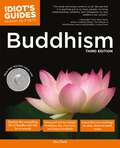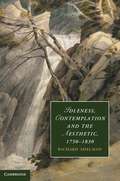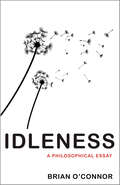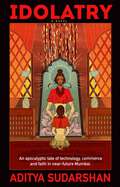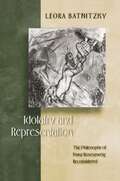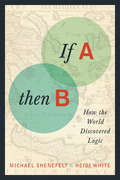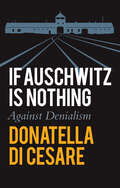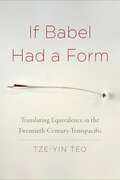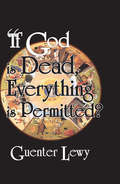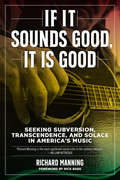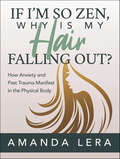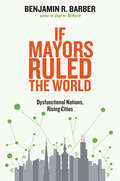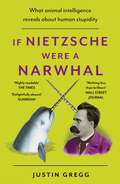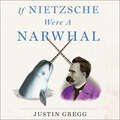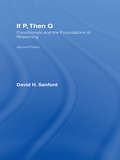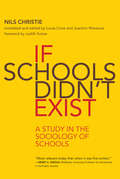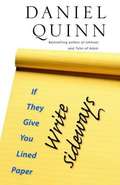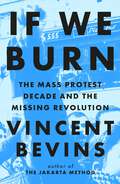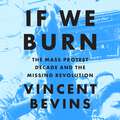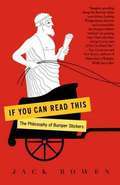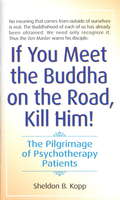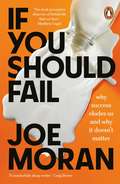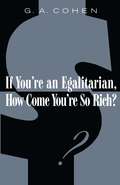- Table View
- List View
Idiot's Guides: Buddhism, 3rd Edition
by Gary GachReach Your Zen Moment! The latest edition of The Complete Idiot's Guide® to Buddhism updates one of Alpha Books's most successful books in the religion/spirituality category, providing extensive information on both understanding the teachings and schools of Buddhism and incorporating the tenets of Buddhism into everyday life. It also includes additional information on Buddhism's effect on popular arts and sciences, the continuing relevance of the Dalai Lama, and an annotated bibliography. • With Buddhism as one of America's fastest growing religions, the audience continues to renew itself • Covers all four schools of Buddhism: Zen, Tibetan, Pure Land, and Insight Meditation, which are not in competitors' books • For thousands of years, Buddhism has been a source of inner peace and security for millions
Idleness, Contemplation and the Aesthetic, 1750–1830
by Richard AdelmanReconstructing the literary and philosophical reaction to Adam Smith's dictum that man is a labouring animal above and before all else, this study explores the many ways in which Romantic writers presented idle contemplation as the central activity in human life. By contrasting the British response to Smith's political economy with that of contemporary German Idealists, Richard Adelman also uses this consideration of the importance of idleness to Romantic aesthetics to chart the development of a distinctly British idealism in the last decades of the eighteenth century. Exploring the work of Adam Smith, Jeremy Bentham, Friedrich Schiller, William Cowper, Samuel Taylor Coleridge, Mary Wollstonecraft and many of their contemporaries, this study pinpoints a debate over human activity and capability taking place between 1750 and 1830, and considers its social and political consequences for the cultural theory of the early nineteenth century.
Idleness: A Philosophical Essay
by Brian O'ConnorThe first book to challenge modern philosophy’s case against idleness, revealing why the idle state is one of true freedomFor millennia, idleness and laziness have been regarded as vices. We're all expected to work to survive and get ahead, and devoting energy to anything but labor and self-improvement can seem like a luxury or a moral failure. Far from questioning this conventional wisdom, modern philosophers have worked hard to develop new reasons to denigrate idleness. In Idleness, the first book to challenge modern philosophy's portrayal of inactivity, Brian O'Connor argues that the case against an indifference to work and effort is flawed--and that idle aimlessness may instead allow for the highest form of freedom.Idleness explores how some of the most influential modern philosophers drew a direct connection between making the most of our humanity and avoiding laziness. Idleness was dismissed as contrary to the need people have to become autonomous and make whole, integrated beings of themselves (Kant); to be useful (Kant and Hegel); to accept communal norms (Hegel); to contribute to the social good by working (Marx); and to avoid boredom (Schopenhauer and de Beauvoir). O'Connor throws doubt on all these arguments, presenting a sympathetic vision of the inactive and unserious that draws on more productive ideas about idleness, from ancient Greece through Robert Burton's Anatomy of Melancholy, Schiller and Marcuse's thoughts about the importance of play, and recent critiques of the cult of work. A thought-provoking reconsideration of productivity for the twenty-first century, Idleness shows that, from now on, no theory of what it means to have a free mind can exclude idleness from the conversation.
Idolatry
by Aditya SudarshanA near future apocalyptic vision of the everyday in Mumbai, India featuring the threat of personal technology in a world of confusing religious motivations.Idolatry, set in Mumbai in the near future, is about a novel technology, Shrine Tech, which enables everyone to worship a god of their own preference. The story follows a disaffected young actor, who is hired as a marketing rep by the company that owns the Tech. It is run by a man calling himself Mister Happy Maker. Soon, the young actor is plunged into the crucible of a society altering in strange and insane ways, in which ordinary individuals (a building society secretary, an indie film-maker, an aged priest, among others) are living their dreams, nightmarishly. Featuring cover art by Broci.FLAME TREE PRESS is the imprint of long-standing Independent Flame Tree Publishing, dedicated to full-length original fiction in the horror and suspense, science fiction & fantasy, and crime / mystery / thriller categories. The list brings together fantastic new authors and the more established; the award winners, and exciting, original voices. Learn more about Flame Tree Press at www.flametreepress.com and connect on social media @FlameTreePress.
Idolatry and Representation: The Philosophy of Franz Rosenzweig Reconsidered
by Leora BatnitzkyAlthough Franz Rosenzweig is arguably the most important Jewish philosopher of the twentieth century, his thought remains little understood. Here, Leora Batnitzky argues that Rosenzweig's redirection of German-Jewish ethical monotheism anticipates and challenges contemporary trends in religious studies, ethics, philosophy, anthropology, theology, and biblical studies. This text, which captures the hermeneutical movement of Rosenzweig's corpus, is the first to consider the full import of the cultural criticism articulated in his writings on the modern meanings of art, language, ethics, and national identity. In the process, the book solves significant conundrums about Rosenzweig's relation to German idealism, to other major Jewish thinkers, to Jewish political life, and to Christianity, and brings Rosenzweig into conversation with key contemporary thinkers. Drawing on Rosenzweig's view that Judaism's ban on idolatry is the crucial intellectual and spiritual resource available to respond to the social implications of human finitude, Batnitzky interrogates idolatry as a modern possibility. Her analysis speaks not only to the question of Judaism's relationship to modernity (and vice versa), but also to the generic question of the present's relationship to the past--a subject of great importance to anyone contemplating the modern statuses of religious tradition, reason, science, and historical inquiry. By way of Rosenzweig, Batnitzky argues that contemporary philosophers and ethicists must relearn their approaches to religious traditions and texts to address today's central ethical problems.
If A, Then B
by Michael Shenefelt Heidi WhiteWhile logical principles seem timeless, placeless, and eternal, their discovery is a story of personal accidents, political tragedies, and broad social change. If A, Then B begins with logic's emergence twenty-three centuries ago and tracks its expansion as a discipline ever since. It explores where our sense of logic comes from and what it really is a sense of. It also explains what drove human beings to start studying logic in the first place. Logic is more than the work of logicians alone. Its discoveries have survived only because logicians have also been able to find a willing audience, and audiences are a consequence of social forces affecting large numbers of people, quite apart from individual will. This study therefore treats politics, economics, technology, and geography as fundamental factors in generating an audience for logic -- grounding the discipline's abstract principles in a compelling material narrative. The authors explain the turbulent times of the enigmatic Aristotle, the ancient Stoic Chrysippus, the medieval theologian Peter Abelard, and the modern thinkers René Descartes, David Hume, Jeremy Bentham, George Boole, Augustus De Morgan, John Stuart Mill, Gottlob Frege, Bertrand Russell, and Alan Turing. Examining a variety of mysteries, such as why so many branches of logic (syllogistic, Stoic, inductive, and symbolic) have arisen only in particular places and periods, If A, Then B is the first book to situate the history of logic within the movements of a larger social world.
If A, Then B
by Michael Shenefelt Heidi WhiteWhile logical principles seem timeless, placeless, and eternal, their discovery is a story of personal accidents, political tragedies, and broad social change. If A, Then B begins with logic's emergence twenty-three centuries ago and tracks its expansion as a discipline ever since. It explores where our sense of logic comes from and what it really is a sense of. It also explains what drove human beings to start studying logic in the first place.Logic is more than the work of logicians alone. Its discoveries have survived only because logicians have also been able to find a willing audience, and audiences are a consequence of social forces affecting large numbers of people, quite apart from individual will. This study therefore treats politics, economics, technology, and geography as fundamental factors in generating an audience for logic-grounding the discipline's abstract principles in a compelling material narrative. The authors explain the turbulent times of the enigmatic Aristotle, the ancient Stoic Chrysippus, the medieval theologian Peter Abelard, and the modern thinkers René Descartes, David Hume, Jeremy Bentham, George Boole, Augustus De Morgan, John Stuart Mill, Gottlob Frege, Bertrand Russell, and Alan Turing. Examining a variety of mysteries, such as why so many branches of logic (syllogistic, Stoic, inductive, and symbolic) have arisen only in particular places and periods, If A, Then B is the first book to situate the history of logic within the movements of a larger social world.
If A, Then B: How the World Discovered Logic
by Michael Shenefelt Heidi WhiteWhile logical principles seem timeless, placeless, and eternal, their discovery is a story of personal accidents, political tragedies, and broad social change. If A, Then B begins with logic's emergence twenty-three centuries ago and tracks its expansion as a discipline ever since. It explores where our sense of logic comes from and what it really is a sense of. It also explains what drove human beings to start studying logic in the first place.Logic is more than the work of logicians alone. Its discoveries have survived only because logicians have also been able to find a willing audience, and audiences are a consequence of social forces affecting large numbers of people, quite apart from individual will. This study therefore treats politics, economics, technology, and geography as fundamental factors in generating an audience for logic—grounding the discipline's abstract principles in a compelling material narrative. The authors explain the turbulent times of the enigmatic Aristotle, the ancient Stoic Chrysippus, the medieval theologian Peter Abelard, and the modern thinkers René Descartes, David Hume, Jeremy Bentham, George Boole, Augustus De Morgan, John Stuart Mill, Gottlob Frege, Bertrand Russell, and Alan Turing. Examining a variety of mysteries, such as why so many branches of logic (syllogistic, Stoic, inductive, and symbolic) have arisen only in particular places and periods, If A, Then B is the first book to situate the history of logic within the movements of a larger social world.If A, Then B is the 2013 Gold Medal winner of Foreword Reviews' IndieFab Book of the Year Award for Philosophy.
If Auschwitz is Nothing: Against Denialism
by Donatella Di CesareEver since the end of the Second World War when the sheer enormity of the Nazi crime against the Jews became apparent, there have been repeated attempts to deny that the Holocaust really happened. The existence of gas chambers was questioned and the testimony of survivors was thrown into doubt: the more witnesses spoke out, the more they were intimidated and attacked by a denialism that sought to present itself as a search for historical truth. The accusation of trickery and deception – so central to the centuries-old anti-Jewish hatred – continues to thrive in our times. Today denialism takes a new and more insidious form: Jews are accused of exploiting the ‘cult of the Holocaust’ not only to found the state of Israel but also in order to take the reigns of power in a New World Order. Holocaust denial has merged with conspiracy thinking, and the ‘world Jewish conspiracy’ has become the cornerstone of the new denialism. Concisely and authoritatively, acclaimed philosopher Donatella Di Cesare reconstructs the evolution of denialism and sheds new light on one of the most troubling phenomena of our time.
If Babel Had a Form: Translating Equivalence in the Twentieth-Century Transpacific
by Tze-Yin Teo“The likeness of form between Chinese and English sentences,” writes the American Sinologist Ernest Fenollosa around 1906, “renders translation from one to the other exceptionally easy.” If Babel Had a Form asks not if his claim may be true, but what its phantasmic surprise may yet do. In twentieth-century intersections of China and Asia with the United States, translations did more than communicate meaning across politicized and racializing differences of language and nation. Transpacific translation breached the regulative protocols that created those very differences of human value and cultural meaning. The result, Tze-Yin Teo argues, saw translators cleaving to the sounds and shapes of poetry to imagine a translingual “likeness of form” but not of meaning or kind.At stake in this form without meaning is a startling new task of equivalence. As a concept, equivalence has been rejected for its colonizing epistemology of value, naming a broken promise of translation and false premise of comparison. Yet the writers studied in this book veered from those ways of knowing to theorize a poetic equivalence: negating the colonial foundations of the concept, they ignited aporias of meaning into flashpoints for a radical literary translation. The book’s transpacific readings glean those forms of equivalence from the writing of Fenollosa, the vernacular experiments of Boxer Scholar Hu Shi, the trilingual musings of Shanghai-born Los Angeles novelist Eileen Chang, the minor work of the Bay Area Korean American transmedial artist Theresa Cha, and a post-Tiananmen elegy by the exiled dissident Yang Lian. The conclusion returns to the deconstructive genealogy of recent debates on translation and untranslatability, displacing the axiom of radical alterity for a no less radical equivalence that remains—pace Fenollosa—far from easy or exceptional.Ultimately, If Babel Had a Form illuminates the demanding force of even the slightest sameness entangled in the translator’s work of remaking our differences.
If God is Dead, Everything is Permitted?
by Guenter LewyDostoevsky's dictum that when God is dead everything is permitted can have several meanings. It can refer to the behavior of individuals suggesting that someone who is or becomes an unbeliever will conduct himself immorally. Alternatively, the saying can pertain to the moral character of an entire country and mean a society that rejects God is doomed to moral decay. Guenter Lewy presents a few of the major arguments of those who question the relationship between morality and religion, and examines the case for the continuing dependence of morality upon religion.Beginning with Dostoevsky's The Brothers Karamazov Lewy introduces the reader to the position that morality depends on religious belief. He then follows the idea throughout history, from its origin, to its extension during the Enlightment, to the Victorians, to the roots of atheism. Lewy then presents a critical discussion of Sweden as a model of a secular nation where morality is retained although most of the population is not religious. He shows that Sweden offers a serious and unique illustration of how democracy and morality can flourish in a post-modern environment.If God is Dead, Everything is Permitted? as the author acknowledges, is more of an essay than a seemless history of the relationship of religion and morality. Lewy's fascination with the intersection and influence of religion on morality is not a new topic. Indeed the discussion is important and alive today in light of new technological and scientific advances. Although Lewy may not put closure to the debate about whether morality is dependent on religion the evidence presented here sheds light on the morality of today by examining its historical past.
If It Sounds Good, It Is Good: Seeking Subversion, Transcendence, and Solace in America's Music
by Richard ManningMusic is fundamental to human existence; it is embedded in our evolution and encoded in our DNA, which is to say, essential to our survival. Academics in a variety of disciplines have devised explanations that Richard Manning, a lifelong journalist, finds hollow, incomplete, ivory-towered, and just plain wrong. He approaches the question from a wholly different angle, using his own guitar and banjo as instruments of discovery. In the process, he finds himself dancing in celebration of music rough and rowdy. American roots music is not a product of an elite leisure class, as some academics contend, but of explosive creativity among slaves, hillbillies, field hands, drunks, slackers, and hucksters. Yet these people—poor, working people—built the foundations of jazz, gospel, blues, bluegrass, rock 'n' roll, and country music, in an unparalleled burst of invention. Use this book to follow where Manning's guitar leads. Ultimately, it sings the American body electric.
If I’m So Zen, Why is My Hair Falling Out?: How Anxiety and Past Trauma Manifest in the Physical Body
by Amanda LeraIf I’m So Zen, Why is My Hair Falling Out? helps those struggling with hair loss take back their confidence and regrow their hair for good by guiding them through the healing and regrowth process.After spending a year meeting with doctors, naturopaths, dermatologists, and trying every fad hair growth product on the market only to have another patch of hair fall out, Amanda Lera knew there had to be another way. The tools Amanda implements in If I’m So Zen, Why is My Hair Falling Out? teaches those struggling with hair loss how to:Regrow their hair fast without expensive, smelly treatments, or harmful medicationsIdentify the true cause of their hair lossPrevent hair loss from happening againGrow fuller, longer, and healthier hair than beforeRelieve anxiety and rebuild their confidenceBreak up with WebMD for good
If Mayors Ruled the World
by Benjamin R. BarberIn the face of the most perilous challenges of our time-climate change, terrorism, poverty, and trafficking of drugs, guns, and people-the nations of the world seem paralyzed. The problems are too big, too interdependent, too divisive for the nation-state. Is the nation-state, once democracy's best hope, today democratically dysfunctional? Obsolete? The answer, says Benjamin Barber in this highly provocative and original book, is yes. Cities and the mayors who run them can do and are doing a better job. Barber cites the unique qualities cities worldwide share: pragmatism, civic trust, participation, indifference to borders and sovereignty, and a democratic penchant for networking, creativity, innovation, and cooperation. He demonstrates how city mayors, singly and jointly, are responding to transnational problems more effectively than nation-states mired in ideological infighting and sovereign rivalries. Featuring profiles of a dozen mayors around the world-courageous, eccentric, or both at once-If Mayors Ruled the World presents a compelling new vision of governance for the coming century. Barber makes a persuasive case that the city is democracy's best hope in a globalizing world, and great mayors are already proving that this is so.
If Nietzsche Were a Narwhal: What Animal Intelligence Reveals About Human Stupidity
by Justin GreggWhat if human intelligence is actually more of a liability than a gift? After all, the animal kingdom, in all its diversity, gets by just fine without it. At first glance, human history is full of remarkable feats of intelligence, yet human exceptionalism can be a double-edged sword. With our unique cognitive prowess comes severe consequences, including existential angst, violence, discrimination, and the creation of a world teetering towards climate catastrophe. What if human exceptionalism is more of a curse than a blessing?As Justin Gregg puts it, there's an evolutionary reason why human intelligence isn't more prevalent in the animal kingdom. Simply put, non-human animals don't need it to be successful. And, miraculously, their success arrives without the added baggage of destroying themselves and the planet in the process.In seven mind-bending and hilarious chapters, Gregg highlights features seemingly unique to humans - our use of language, our rationality, our moral systems, our so-called sophisticated consciousness - and compares them to our animal brethren. What emerges is both demystifying and remarkable, and will change how you look at animals, humans, and the meaning of life itself.
If Nietzsche Were a Narwhal: What Animal Intelligence Reveals About Human Stupidity
by Justin GreggA MYTH-BUSTING EXPOSÉ OF HOW HUMAN INTELLIGENCE MAY BE MORE A LIABILITY THAN A GIFT AND A REFRESHING NEW WAY TO UNDERSTAND THE ANIMAL KINGDOM AND OUR PLACE ON EARTH.What if human intelligence is actually more of a liability than a gift? After all, the animal kingdom, in all its diversity, gets by just fine without it. At first glance, human history is full of remarkable feats of intelligence, yet human exceptionalism can be a double-edged sword. With our unique cognitive prowess comes severe consequences, including existential angst, violence, discrimination, and the creation of a world teetering towards climate catastrophe. What if human exceptionalism is more of a curse than a blessing?As Justin Gregg puts it, there's an evolutionary reason why human intelligence isn't more prevalent in the animal kingdom. Simply put, non-human animals don't need it to be successful. And, miraculously, their success arrives without the added baggage of destroying themselves and the planet in the process.In seven mind-bending and hilarious chapters, Gregg highlights features seemingly unique to humans - our use of language, our rationality, our moral systems, our so-called sophisticated consciousness - and compares them to our animal brethren. What emerges is both demystifying and remarkable, and will change how you look at animals, humans, and the meaning of life itself.(P) 2022 Hachette Audio
If P, Then Q: Conditionals and the Foundations of Reasoning (The\problems Of Philosophy Ser.)
by David SanfordThis new edition includes three new chapters, updating the book to take into account developments in the field over the past fifteen years.
If Schools Didn't Exist: A Study in the Sociology of Schools
by Nils ChristieA classic in the philosophy of education, considering the fundamental purpose and function of schools, translated into English for the first time.This classic 1971 work on the fundamental purpose and function of schools belongs on the same shelf as other landmark works of the era, including Ivan Illich's Deschooling Society, Paulo Freire's Pedagogy of the Oppressed, and John Holt's How Children Fail. Nils Christie's If School Didn't Exist, translated into English for the first time, departs from these works by not considering schooling (and deschooling) as much as schools and their specific community and social contexts. Christie argues that schools should be proving grounds for how to live together in society rather than assembly lines producing future citizens and employees.
If They Give You Lined Paper, Write Sideways
by Daniel QuinnIn Ishmael, Daniel Quinn offered new ways of seeing and understanding human history, and our collective future. His message was transformative for millions of people, and Ishmael continues to attract tens of thousands of new readers each year. Subsequent works, such as The Story of Band in My Ishmael, expanded upon his insights and teachings, but only now does he finally tackle the one question he has been asked hundreds of times but has never taken on: "How do you do what you do?" In If They Give You Lined Paper, Write Sideways, Quinn elucidates for readers the methods behind his own thought processes, challenging and ultimately empowering them to view the world for themselves in creative, perhaps even revolutionary ways. If They Give You Lines Paper, Write Sideways also includes Quinn's never-before-published essays "The New Renaissance" and "Our Religions." There is a scientific consensus that global warming is approaching a tipping point beyond no return faster than had previously been predicted. Quinn has long portrayed humans as "a species of beings, which, while supposedly rational, are destroying the very planet they live on." So what are we to do? There has never been a plan for the future - and there never will be. But something extraordinary will happen in the next two or three decades; the people of our culture will learn to live sustainably - or not. Either way, it will be extraordinary. The sooner we understand this reality, the greater the chances that human society will transform itself so that the human race might have a future.
If We Burn: 'as good as journalism gets'
by Vincent BevinsThis book is phenomenal ... It's about as good as journalism gets ...The highest praise I can give If We Burn is to say that it would be criminally negligent not to read it if you'd like to change the world. - ROB DELANEY Bevins's clear-eyed, sympathetic account of the unfulfilled promise of these protests leaves his reader with a bold vision of the future. - MERVE EMREA stunning history of now. - GREG GRANDINFrom 2010 to 2020, more people took part in protests than at any other point in human history. Why has success been so elusive?From the so-called Arab Spring to Gezi Park in Turkey, from Ukraine's Euromaidan to student rebellions in Chile and Hong Kong, the second decade of the twenty-first century was propelled by explosive mass demonstrations. But few people got what they wanted. In too many cases, the protests led to the opposite of what they asked for.If We Burn is a stirring work of global history built around that strange but fundamental paradox. Acclaimed journalist Vincent Bevins interviewed hundreds of people around the world, and weaves their insights and recollections into a fast-paced, gripping narrative. We follow his own troubling experiences in Brazil, where a protest movement ignited by leftists and anarchists led to an extreme-right government that torched the Amazon.In the mass protest decade, humanity demonstrated a deep desire for change, and brave individuals started something that has been left unfinished. In this ground-breaking study of an extraordinary chain of events, protesters and major actors offer urgent lessons for those who wish to understand geopolitics today, and create a better world tomorrow.
If We Burn: 'as good as journalism gets' - Rob Delaney
by Vincent BevinsFrom 2010 to 2020, more people took part in protests than at any other point in human history. Why has success been so elusive?From the so-called Arab Spring to Gezi Park in Turkey, from Ukraine's Euromaidan to student rebellions in Chile and Hong Kong, the second decade of the twenty-first century was propelled by explosive mass demonstrations. But few people got what they wanted. In too many cases, the protests led to the opposite of what they asked for.If We Burn is a stirring work of global history built around that strange but fundamental paradox. Acclaimed journalist Vincent Bevins interviewed hundreds of people around the world, and weaves their insights and recollections into a fast-paced, gripping narrative. We follow his own troubling experiences in Brazil, where a protest movement ignited by leftists and anarchists led to an extreme-right government that torched the Amazon.In the mass protest decade, humanity demonstrated a deep desire for change, and brave individuals started something that has been left unfinished. In this ground-breaking study of an extraordinary chain of events, protesters and major actors offer urgent lessons for those who wish to understand geopolitics today, and create a better world tomorrow.(P) 2023 Hachette Book Group
If You Can Read This: The Philosophy of Bumper Stickers
by Jack BowenMixing pop culture with the ideas of historically prominent philosophers and scientists, "If You Can Read This" exposes the deeper wisdom couched behind bumper sticker slogans.
If You Meet the Buddha on the Road, Kill Him: The Pilgrimage Of Psychotherapy Patients
by Sheldon KoppTherapists do not and cannot give answers. Explore the true nature of the therapeutic relationship, and realize that the guru is no Buddha. He is just another human struggling. Understanding the shape of your own personal ills will lead you on your journey to recovery. Sheldon Kopp has a realistic approach to altering one's destiny and accepting the responsibility that grows with freedom.
If You Should Fail: A Book of Solace
by Joe Moran'There is an honesty and a clarity in Joe Moran's book If You Should Fail that normalises and softens the usual blows of life that enables us to accept and live with them rather than be diminished/wounded by them' Julia Samuel, author of Grief Works and This Too Shall Pass 'Full of wise insight and honesty. Moran manages to be funny, erudite and kindly: a rare - and compelling - combination. This is the essential antidote to a culture obsessed with success. Read it' Madeleine BuntingFailure is the small print in life's terms and conditions.Covering everything from examination dreams to fourth-placed Olympians, If You Should Fail is about how modern life, in a world of self-advertised success, makes us feel like failures, frauds and imposters. Widely acclaimed observer of daily life Joe Moran is here not to tell you that everything will be all right in the end, but to reassure you that failure is an occupational hazard of being human. As Moran shows, even the supremely gifted Leonardo da Vinci could be seen as a failure. Most artists, writers, sports stars and business people face failure. We all will, and can learn how to live with it. To echo Virginia Woolf, beauty "is only got by the failure to get it . . . by facing what must be humiliation - the things one can't do."Combining philosophy, psychology, history and literature, Moran's ultimately upbeat reflections on being human, and his critique of how we live now, offers comfort, hope - and solace. For we need to see that not every failure can be made into a success - and that's OK.
If You're an Egalitarian, How Come You’re So Rich?
by G. A. CohenThis book presents G. A. Cohen's Gifford Lectures, delivered at the University of Edinburgh in 1996. Focusing on Marxism and Rawlsian liberalism, Cohen draws a connection between these thought systems and the choices that shape a person's life. In the case of Marxism, the relevant life is his own: a communist upbringing in the 1940s in Montreal, which induced a belief in a strongly socialist egalitarian doctrine. The narrative of Cohen's reckoning with that inheritance develops through a series of sophisticated engagements with the central questions of social and political philosophy. In the case of Rawlsian doctrine, Cohen looks to people's lives in general. He argues that egalitarian justice is not only, as Rawlsian liberalism teaches, a matter of rules that define the structure of society, but also a matter of personal attitude and choice. Personal attitude and choice are, moreover, the stuff of which social structure itself is made. Those truths have not informed political philosophy as much as they should, and Cohen's focus on them brings political philosophy closer to moral philosophy, and to the Judeo-Christian ethical tradition, than it has recently been.
